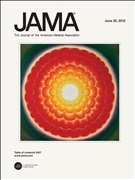
Physical Therapy & Rehab
Rehab + advice offers no benefit over advice alone after immobilization for ankle fracture
This report has been verified
by one or more authors of the
original publication.
JAMA. 2015 Oct 6;314(13):1376-85
214 patients with isolated ankle fractures treated with immobilization (with or without open reduction and internal fixation) were included in this randomized controlled trial to assess if the addition of a supervised exercise to advice provided improvements in activity limitation and quality of life over 6-month follow-up in comparison to advice alone. Additionally, fracture severity, age, and sex were evaluated as possible moderating factors. The results at 1, 3, and 6 months indicated similar improvement between groups in activity limitation on the Lower Extremity Functional Scale (LEFS) and quality of life on the Assessment of Quality of Life (AQoL) instrument. The treatment effects did not appear to be moderated by fracture severity, age or sex. However, clinically important differences (non-significant) were found in favor of the advice group for secondary outcomes of physical activity, and return to pain-free walking and full prefracture work. Both methods incurred similar total costs. It should be noted that enrollment was stopped prior to reaching the predetermined sample size due to exhaustion of funds.
Unlock the full article
Get unlimited access to OrthoEvidence with a free trial
Start TrialCritical appraisals of the latest, high-impact randomized controlled trials and systematic reviews in orthopaedics
Access to OrthoEvidence podcast content, including collaborations with the Journal of Bone and Joint Surgery, interviews with internationally recognized surgeons, and roundtable discussions on orthopaedic news and topics
Subscription to The Pulse, a twice-weekly evidence-based newsletter designed to help you make better clinical decisions
Exclusive access to original content articles, including in-house systematic reviews, and articles on health research methods and hot orthopaedic topics
Or continue reading this full article
Register Now

Subscribe to "The Pulse"
Evidence-Based Orthopaedics direct to your inbox.





































